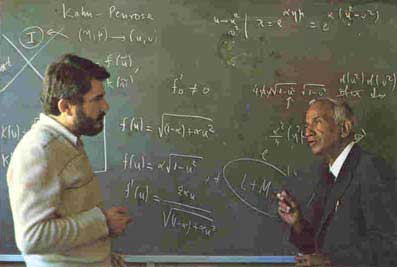
| Home |
| History |
| Activities |
| Organization |
| Fellowships & Prizes |
| GR news |
| Conferences list |
| Job Opportunities |
| Membership & Dues |
| Related Organizations |
| Members Area |
The Basilis Xanthopoulos International AwardRegretfully, nominations will no longer be accepted for this prize. Basilis Xanthopoulos (left) in discussion with Subrahmanyan Chandrasekhar This Award was established by the Foundation for Research and Technology - Hellas (FORTH) to honor the memory of Basilis Xanthopoulos, an outstanding Greek general relativist. Xanthopoulos was born in Drama, Greece in 1951. After majoring in Mathematics at the University of Thessaloniki he moved to the University of Chicago, where he earned his Ph.D. in 1978 under the supervision of Robert Geroch. During this time, he also collaborated with Abhay Ashtekar and especially Subrahmanyan Chandrasekhar with whom he wrote a series of influential papers on colliding gravitational waves. After a post-doctoral position at Syracuse he returned to Greece, serving on physics faculties, first in Thessaloniki and then in Crete. Xanthopoulos made important contributions to several branches of mathematical general relativity, especially the areas of exact solutions, global issues associated with asymptotic flatness and black holes, as well as gauge theories. He was widely admired for his clarity of thought, energy and selflessness. His promising career was tragically cut short during his seminar on November 27, 1990 when he was shot to death by a deranged student. The Xanthopoulos Award was established in 1991. In 1997, Abhay Ashtekar, Chair of the then Selection Committee, arranged with FORTH to transfer the prize to the auspices of the International Society on General Relativity and Gravitation (ISGRG). A Charter was prepared for the appointment of the Selection Committees and administration of the Award. It is now given during the tri-annual international conferences of the Society to a scientist, below 40 years of age, who has made outstanding (preferably theoretical) contributions to gravitational physics. The monetary value of the Award is approximately US $ 10,000. The Award winners are:
1991: Demetrios Christodoulou (Courant Institute) |